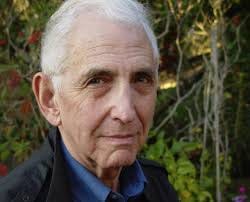Dr. Daniel Ellsberg, an elder statesman of the anti-Vietnam War movement, talked to students Sept. 24 at Berkeley City College.
He told of his experience as a whistleblower, and compared them to those of Chelsea (Bradley) Manning and Edward Snowden.
He also shared his insights on Syria and his feeling that the power of democracy swayed our President away from war.
Ellsberg achieved notoriety during the Vietnam War by releasing “The Pentagon Papers,” a top-secret document commissioned by then-U.S. Secretary of State Robert McNamara. Ellsberg was granted access to the study while working for the RAND Corp., a defense contractor.

Upon reading the papers, Ellsberg said it was “a continuous record of governmental deception and fatally unwise decision-making, cloaked by secrecy, under four presidents.” Ellsberg said the information in the study needed to be brought to light. “Only a better informed Congress and public might act to avert indefinite prolongation and further escalation of the war.”
Ellsberg gave a copy to Sen. J. William Fulbright of the Senate Foreign Relations Committee, in the hopes he would reveal the documents, “which he had every legal right to do.” Ellsberg said. “When Sen. Fulbright failed to hold the hearings he’d promised me he’d hold, eventually I gave it to the New York Times.
“That led to the first injunction (against a newspaper) in our history, the first such prior restraint in American history, a clear challenge to the First Amendment.”
Ellsberg, not deterred by the injunction, responded by giving “copies to the Washington Post and eventually, when the Post and two other papers were also (restrained), to 19 papers in all.”
Ellsberg was soon indicted, which he had expected; “I had no doubt in my mind, while I was copying 7000 pages of top-secret papers, I would go to jail for the rest of my life.”
He said he felt “that at that time, with the war, the Vietnam War, it was worth it.”
Ellsberg told the crowd that he felt inspired at the time by the actions of draft resisters such as Randy Keller, who were willing to face jail for their beliefs. “That put in my head: what can I do to help shorten the war, now that I’m willing to go to prison,” he said.
The first indictment was for three counts, but it was soon followed by another that raised it to 12 counts with a possible sentence of 115 years. Ellsberg said the case of NSA whistleblower Edward Snowden is similar to his. “At the moment Snowden is only facing 30 years for three counts” but that “he will undoubtedly face (a much longer sentence) when they finish adding charges.”
The case against Ellsberg went to court about a year and a half later, but was abruptly dropped just before closing arguments when illegal actions by the government against him came to light.
“Nixon did warrantless wiretaps against me, he broke into my doctors’ office to get information with which to blackmail me, and used the CIA against me,” he said.
Ellsberg has continued with his activism over the years, but told the audience he was longing to be joined by others.
“The reason I was so moved by the example of Chelsea Manning was that I waited 40 years for someone to do what Manning has done, to put out enough material to really make the case…that there is a policy of deception.”
Ellsberg said that Snowden coming out with his revelations was largely the result of Manning’s actions three years earlier. “One of the things that Manning is to be thanked for is Snowden; courage is contagious!”
Ellsberg told the students that the actions of the anti-war movement helped end the Vietnam War “with the exception of the violence that the Weathermen and other radical groups used.” He credited teach-ins about the war, some of which were held around the clock, with helping to create an informed student-body on many campuses.
“The students came to understand more about Vietnam, the history of it, the characteristics of the war, than any official of the government known to me.”
He credited the power that public opinion has in our democracy with helping avert war with Syria by persuading President Obama to send the war resolution to congress, where it faced heavy opposition. Ellsberg said he hadn’t seen anything like it since congress defunded the Vietnam War. “Remember, no other Constitution gives that kind of power to congress or parliament. It’s up to us, it’s up to us.”
Ellsberg ended on an optimistic note regarding Syria, saying he is hopeful not only that there will be no U.S. strike, but that “it may very well lead to negotiations where Iran is included, all the local parties (are included)”.
























